One of the things we love to do as a team here at MHC is solve difficult SEO mystery cases. While we usually are pretty good at determining why a site’s traffic has dropped, every now and then a case stumps us. This is one of those cases. I thought it would be great to write a post on this, as we had the permission of the site owner to do so, and see if some of the amazingly smart people in the SEO community (hint...that means you) can figure it out!
Can you help solve this? In appreciation of your help, we’re going to give away a one year paid membership to Search News You Can Use to the person who gives us the most valuable tip that helps us figure this out!
I was recently contacted by Richard Hughes from Careers in Music. He asked if we could help figure out an unusual traffic drop mystery. The odd thing though, is that the drop he was seeing was in direct traffic. Here is the direct traffic to this site:

That’s a pretty big drop!
Before we get into the nitty gritty details, here is a summary of the problems that this site is seeing:
- A massive drop in traffic classified as direct starting on May 27, 2018.
- A big increase in traffic classified as organic search traffic starting on May 28, 2018.
- An overall drop in rankings and traffic from this point on.
What is direct traffic?
While many people think that direct traffic consists of only visitors who typed your url into their browser bar, this is not true. Direct traffic is any traffic that Google Analytics cannot figure out where to place elsewhere.
Here are some common reasons for traffic to be classified as direct:
- The user typed the url into the search bar.
- Someone arrived at the site by using a bookmark.
- A meta refresh or javascript redirect was used to get to a page.
- A visitor clicked on a link from an https page that points to an http page. Unless the https page is using a meta referrer tag, then this traffic, rather than being shown as referrer traffic will now be called direct.
There are other reasons too such as clicking on an untracked link in an email or dark social links. The main point though, is that when GA cannot figure out how to classify a source of traffic they’ll call it direct.
Organic traffic boost
We saw that direct traffic dropped for this site starting on May 28, 2018. Coincidentally, traffic from organic search increased:
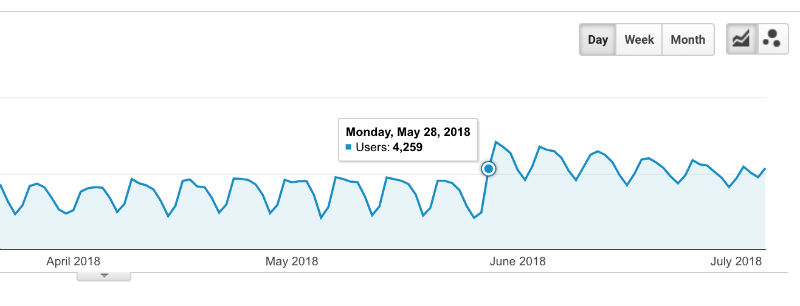
They also saw a temporary spike in social traffic:
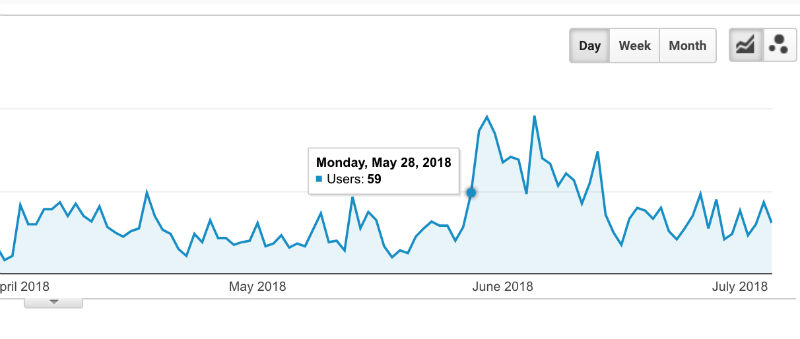
There was no obvious change at this time in referral traffic:
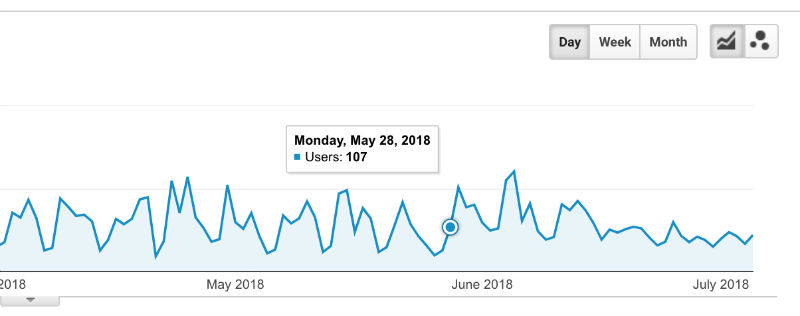
So, was all of this loss in direct traffic just shifted over to the organic and social buckets? This does not appear to be the case as overall traffic numbers started to decline on May 28 and are continuing on a downward slide:
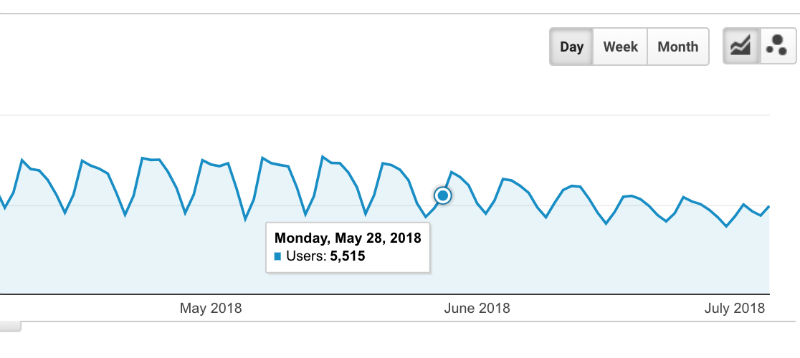
Some other interesting stats
It is interesting to see that on May 28, 2018, when this change happened, analytics is reporting a big increase in Google organic traffic and Yahoo! organic, but not Bing:
Google organic:
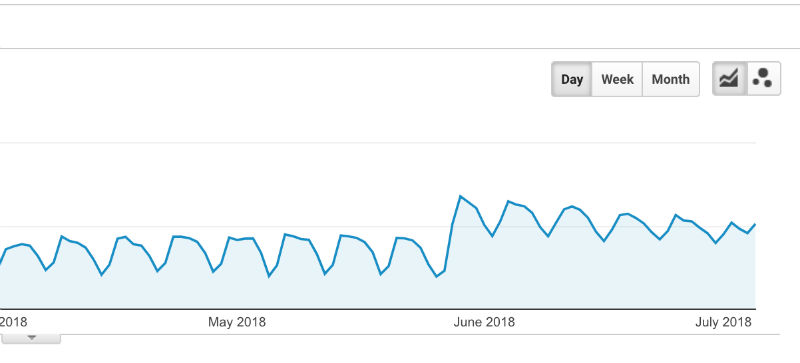
Yahoo organic:
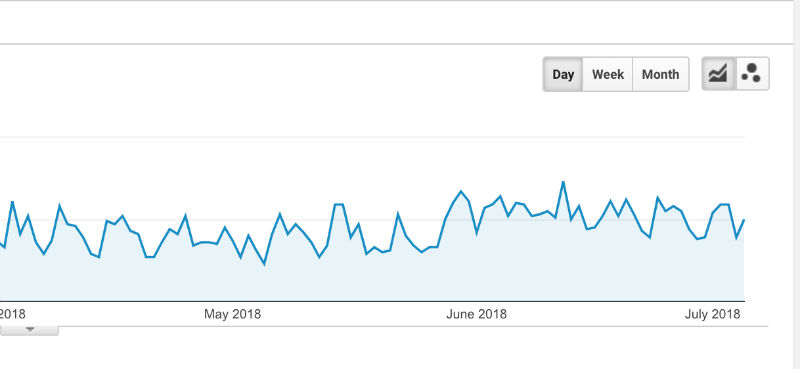
Bing organic:
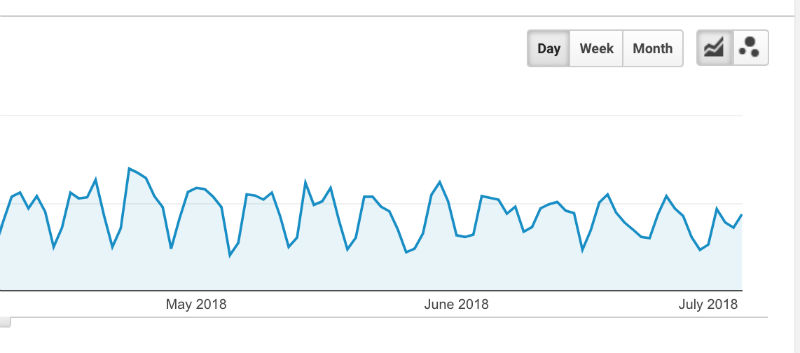
The changes in direct and organic traffic were consistent across both desktop and mobile. Also, it seems that all pages on the site saw drops including the following.
The home page:
 Category pages:
Category pages:

Survey pages. (This site gets conversions by having people complete a survey.):

Blog pages saw a drop in direct traffic without the coincidental boost in organic. However, there is not nearly as much volume of traffic on these pages so it’s hard to draw conclusions here:

GSC Data
Search Console is showing that impressions, clicks, CTR and rankings started decreasing around May 27-28 as well:
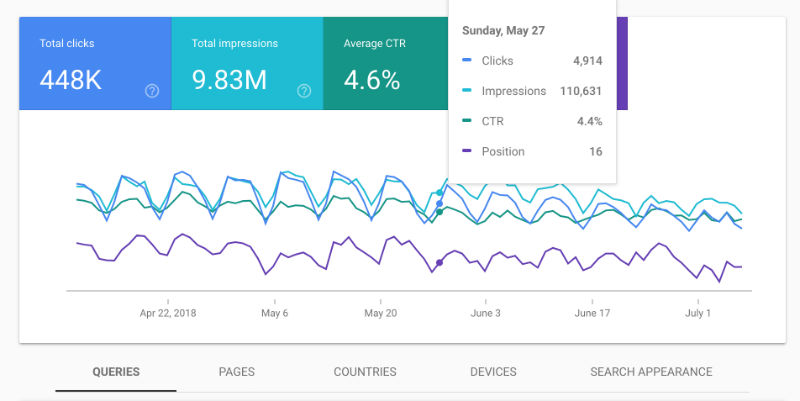
We checked several different pages and queries and the drop seems like it is across the entire site.
GDPR Connection?
One thing that we considered is that May 25, 2018, just a few days before the drop, was the date on which GDPR went live. We had wondered if perhaps the site’s cookie notification bar was related to the problem. However, their developer informed us that this bar went live in June, so this is not likely to be the issue.
I do think it is conceivably possible that the issue has something to do with how Google Analytics tracks users. But, I just can’t see how GDPR tracking in GA could cause this site to be seeing a big loss in direct traffic, a gain in organic and an overall drop in sessions altogether. Also, if this was a common GA issue, we would be hearing of many other similar cases.
Some other information about conversions
One of the tricky things about this site is that users are encouraged to take a survey which generates leads for the site. Users who do this are taken off of the site to SurveyGizmo and then return back to a subdirectory (finder.careersinmusic.com). We had wondered if perhaps SurveyGizmo had made some changes in how they track users (in connection to GDPR) that possibly stripped out personally identifiable data and caused people who were coming back to the site to be misclassified by GA. However, this doesn’t make sense as we would expect to see an increase in direct visits if this were happen, rather than the drastic decrease that we saw.
What do you think?
It’s not common for me to write a post like this. We do a lot of site assessments and usually can figure this type of issue out within a couple of hours. I decided to write this because Richard gave us permission to do so, and also because I think that finding the answer could be beneficial to many people.
Do you have any ideas on what is going on? Once we get the answer I’ll update the article. But for now, I’d love for you to leave a comment below. Again, we’ll give a free year’s subscription to my newsletter (normally $18 per month) to the person who gives the most helpful answer to solve this.
Did you know that the MHC team is participating in a contest to try and rank for the term “Wix SEO”? It has been fun!



Comments
Things I would check – if not already checked.
1) Mobile First changes
2) Issues with GA install or tracking change so direct is now referral etc?
3) Interstitial issues
4) Ever been any links from an app?
5) Have any pages been no-indexed?
6) Any switch to https or change in traffic hitting from http to https?
You mentioned that there is a point where you are taken off the site and then redirected back – Unrelated to anything GDPR, I would check this out and send a test bot / persona along and track it through to coming back again.
Probably a load more things still to check 🙂
Andy
Site owner here –
Andy
Many thanks for the feedback.
1. We did not make the site with a mobile first approach. It was made about three years ago. That said, we have not made any significant mobile changes that I can recall.
2. It was noted our surveys have two instances of the GA code embedded. What effect might that have? At some point, we updated the GA code from the older version. Would this really cause that kind of chaos to the analytics? Affecting numbers that much?
3. We have not used any Interstitial elements, at least nothing that strikes me as such.
4. I am not aware of links from an App in the past or present.
5. Yes. Mainly template pages, cart pages, author pages, and some product pages. They have been no-indexed for quite some time though.
6. We have been https for a number of years.
This is indeed a mystery to me.
Heya,
Couple of my twitter comments:
There appears to be two tag declarations on the site – global site tag and an Analytics tag. It’s possible that they have conflicting setups.
If you are open to sharing the profile I wouldn’t mind a look at some of the other metrics to see if I can get a better understanding of the traffic lost
Site owner here –
Can you please elaborate on the double tags?
Hi Richard,
Not really any further, I see a global site tag and a seperate analytics tag.
if they are both are/were recording your analytics data that would be a problem
I just wanted to comment fast so forgive me if I missed something obvious from the article ;-).
My absolute first thought from the heading is that some form of anti-virus software or similar (perhaps even Google Chrome) was reporting his website and giving warnings to people trying to visit it.
I feel your screenshots re: search traffic might have been a bit of a bluff haha.
Site owner here –
Is there a way to test for site warnings like this? Our SSL is always kept up-to-date. I am not aware of any such issues. Ideas?
One option I would look at is if one of their main traffic sources recently switched to https. If they were previously using http and linking to his https site, the referral data wouldn’t be passed and it would show up as direct.
Also, did they update any internal links that were previously http and now https?
Site owner here –
Joy,
Interesting idea. You’re suggesting an external site linking to us was using http and switched to https, thus causing the number swings? That site would have to refer a lot of traffic.
I will say that I have noticed for quite some time a higher ratio of Direct traffic than made sense. Where was all this coming from? I’ll dig into it.
Great thought Joy. Losing an https referrer was one of our first thoughts too. Unfortunately I don’t think this is the issue though.
This is fascinating and eerily similar to a situation I had with a large healthcare client 18 months ago. Over the course of two weeks, we went from 3,000 direct traffic visits on weekdays to less than 200 direct traffic visits daily. Not a direct drop-off for us.
Three key data points for us: the drop was only on people who landed on the homepage, the drop disproportionately impacted mobile, and disproportionately impacted users in the organization’s city.
We never actually found the culprit, and unfortunately ended up losing the client (despite conversions continuing to grow! ugh).
Our best hypotheses were that it was a user behavior scenario. E.g.:
-Company updated email signature style for all employees and dropped the URL from email signature
-Employee intranet log-in (separate domain) became default homepage on company browsers
At the time, the biggest frustration for me was not being able to find anyone else who had a similar scenario to us in GA. Thanks for sharing – I’m super interested in what you figure out.
Good pointss. check by device. Branded queries by device. has the site rebounded since through the mobile first index coming into play?
Hi Mary,
I’d check AMP and AGSA (Android Google Search App)
And also, you’re sharing pageviews and not sessions, so maybe there’s something there
Site owner here –
Javier,
If we had significant mobile site speed issues that would affect traffic like this, wouldn’t we see this in mobile traffic numbers?
Yeah, there really wasn’t a difference in mobile vs desktop. I don’t think this is a mobile issue.
Sorry, Marie not Mary
I would check
– If any new areas, pages or functionalities (such as AMP) have been launched and are not being correctly tracked.
– Compare their rankings vs the ones of their competitors to identify if it is a “query related” problem.
– Check “Crawl Errors” in GSC for a possible accessibility & crawlability issue
– Check “Security Issues” in GSC for a possible web security problem
– Check “Manual actions” in GSC for a possible manual penalization
What do the brand searches look like? Loss of knowledge panel? Loss of branded queries? I can’t think of anything else apart from that, a manual action wouldn’t logically have the effect of losing brand and increasing Organic so to me it points to cookie acceptance and at the same time that small change has improved Organic. weirdly.
Strange one. The only scenario that I can think of that would explain why both Google and Yahoo increased whiel Direct dropped is some sort of redirect situation being resolved. If a redirect was getting in the way of a lot of search traffic then it might be stripping the referrer and being classified as Direct. When that is resolved then the traffic might be reassigned to the various search engines. Doesn’t explain Bing or the gradual drop in traffic afterwards though.
The proximity to GDPR day is also a bit of a coincidence.
Could a GDPR change have resolved such a redirect issue?
There are a lot of redirects on the site so is it possible that the indexing flipped over from old to new addresses?
Needs more thought (and probably a lot more detailed insight about the site history) but that where I’d start looking in detail. Has anyone looked at the server logs for that time period?
Maybe it’s a change from the server side. Have they been allowing bots to the site for quite some time which have been attributed as direct traffic, and now those bots are blocked? Maybe worth checking in with the host to see if they made any changes around those dates.
I notice that there are two GA code blocks on the survey pages. Is that new? Presumably that would cause duplicate views to be counted. Other than that, were there any changes made to the site in May?
Matt,
I cannot recall when we last touched the GA code. I see in the survey admin there is a place to add your GA tracking ID. Survey Gizmo then seems to place it in the HTML wrapped in the according GA code.
We also have it placed in the custom HTML. That was done a few years back.
Would it be advisable to remove one instance? Does it appearing twice really trick GA into inaccurate stats?
Mysterious indeed. GDPR proximity is interesting – perhaps one of their plugins or the builder made a GDPR change re tracking? Did you isolate mobile traffic for analysis? One odd thing I noticed looking at the source code is that the nav is duplicated and is a mix of absolute and relative links. And there appears to be a separate mobile link for the survey finder in every occurrence in the nav menu.
Curious to hear what it ends up being!
Site owner here –
Cris,
Thanks for the feedback.
I hadn’t noticed we left some nav links as absolute. I just changed them to relative.
I’m not sure about a plugin related to GDRP. Could be, but I am not sure how I’d confirm.
I did not notice any significant difference in mobile vs other traffic. Maybe Marie can chime in here?
We spent a good amount of time looking at mobile vs desktop and saw issues with both. This doesn’t seem to be a mobile issue.
Hi Marie,
Well, usually for me the case is almost the opposite – if there is a GA monitoring issue, usually the direct traffic “steals” sessions from the organic, and not vice versa
Anyway, my thoughts:
1. I wrote a post about this case study:
https://www.tldrseo.com/google-analytics-direct-not-set/
Although that’s NOT the case in here, I’ve found using the real time in GA as I elaborated in the post highly useful to identify GA anomalies.
2. I would try to check the traffic by device to see if it’s related to the mobile site. Very common from my experience. Also, try to filter by a location if there is some source outside the US that makes the “noise”
3. You’ve mentioned an increase for survey pages, if you’re referring to the finder pages it doesn’t make sense as they have noindex tag, for example:
https://finder.careersinmusic.com/s3/music-school-finder
In SimilarWeb, I can see this subdomain gets a share of 10% of the traffic, but from which source exactly? You van check it on your hand.
Also checked for the GA code for the main domain and subdomain – they are the same, as it should be
3. Changes – I’m sure as an expert this will be obvious to you, but I’ll mention it anyway – check with the client if ANY changes were made in the last months. Everything counts and can be a factor. Which takes us to the next question.
4. Cookies agreement – was it always there? Maybe is part of the mandatory GDPR? I have a client who updated his site with an accessibility plugin (which is now mandatory in Israel) and after checking this for hours I’ve solved it – the browser made kind of a redirect for a first time user (without cookies). For a returning visitor it didn’t matter.
So in this case, there was a decline in organic traffic. We fixed the JS redirect and it was resolved.
Site owner here –
Roey,
Thanks so much for your feedback.
1. I’ll read your article and see what I can find.
2. When you say “mobile site” are you referring to traffic from mobile search? We do not have a second mobile version. It’s a single, responsive site.
3.1 There has not been an increase in total Surveys but a decrease of around 25% over last year. I do not have access to SimilarWeb. Maybe Marie can have a look?
3.2 I did not keep a detailed record of every change we made during this period. I can say there are no major site changes I can think of. Nothing major in content, navigation, code, platform or otherwise.
4. We added the Cookies agreement on June 12, well after this issue was taking hold. A note from our developer “Cookies are not prevented from being stored until the user agrees, so the site experience is the same with and without the user having clicked the buttons that dismiss the consent banner.”
Hey Richard,
For your questions:
1. And yes, I meant comparing the organic and direct traffic in mobile devices vs. desktop.
It doesn’t matter if you have a responsive design, I would still check this out (although it reduces the room for any issues)
2. You don’t need an access to Similarweb, that’s just an external tool. You have the best resource to check it out – your Google Analytics. I’ve mentioned it because I’ve found it really weird that the survey pages which are not indexed (because of the meta robots tag) get ANY organic traffic. That’s a big question mark for me.
3. Regarding cookies – it’s less an issue of cookies being stores and more of a really another case study of a client of mine which his plugin (in this case – for accessibility) made a JS redirect that enforced some issues with the monitoring in GA.
Great points Roey. I think we’ve investigated all of these though. I really thought the cookie disclaimer was to blame, but the implementation dates don’t line up unfortunately.
I agree with her and Well, usually for me the case is almost the opposite – if there is a GA monitoring issue, usually the direct traffic “steals” sessions from the organic, and not vice versa
Hi Marie,
Well, usually for me the case is almost the opposite – if there is a GA monitoring issue, usually the direct traffic “steals” sessions from the organic, and not vice versa
Anyway, my thoughts:
1. I wrote a post about this case study:
https://www.tldrseo.com/google-analytics-direct-not-set/
Although that’s NOT the case in here, I’ve found using the real time in GA as I elaborated in the post highly useful to identify GA anomalies.
2. I would try to check the traffic by device to see if it’s related to the mobile site. Very common from my experience. Also, try to filter by a location if there is some source outside the US that makes the “noise”
3. You’ve mentioned an increase for survey pages, if you’re referring to the finder pages it doesn’t make sense as they have noindex tag, for example:
https://finder.careersinmusic.com/s3/music-school-finder
In SimilarWeb, I can see this subdomain gets a share of 10% of the traffic, but from which source exactly? You van check it on your hand.
Also checked for the GA code for the main domain and subdomain – they are the same, as it should be
3. Changes – I’m sure as an expert this will be obvious to you, but I’ll mention it anyway – check with the client if ANY changes were made in the last months. Everything counts and can be a factor. Which takes us to the next question.
4. Cookies agreement – was it always there? Maybe is part of the mandatory GDPR? I have a client who updated his site with an accessibility plugin (which is now mandatory in Israel) and after checking this for hours I’ve solved it – the browser made kind of a redirect for a first time user (without cookies). For a returning visitor it didn’t matter.
So in this case, there was a decline in organic traffic. We fixed the JS redirect and it was resolved.
Google searchbox in mobile and weblight results causing this problem, as they go under referrals and the site Analytics is not able to identify that, so falling under direct traffic
Site owner here –
Are you referring to Google Site Search which was canceled in Feb? We did replace that with another site search called Swiftype in the first week of Feb. Could that have anything to do with this?
The site is losing backlinks. Ever since 27th May, you have 613 lost backlinks. Have you dug in there? Could traffic from those be considered as direct before they were lost?
You’ve also lost a lot of backlinks in the previous months, too.
Site owner here –
Is there a way to track those lost links?
It does not seem like this would account for the shift though. We lost 80% direct traffic and gained in Organic. Users are only down a small percentage. In April, for example, users were up.
You can use tools such as ahrefs, semrush, majestic seo and audit your backlink profile. I used ahrefs to find your lost links.
Have you checked where the growth in organic traffic has come from? The drop in direct traffic and the growth in organic doesn’t have to be connected.
I just noticed that you have 276 redirects on your website.
Examples: https://www.careersinmusic.com/music-schools-missouri 301 redirects to https://www.careersinmusic.com/music-schools-missouri/;
https://www.careersinmusic.com/staff-publicist%20 301 redirects to https://www.careersinmusic.com/staff-publicist/
When were these done? Were both versions of the url indexed before you made them? If they were both indexed, people might have used them both to enter your website and that might have kept the levels of your direct traffic high. Once you made the redirects, google only indexes one version of the urls, and counts the traffic correctly.
Nice findings. The loss in backlinks could account for the slow decline in traffic (assuming they were good links). But it doesn’t explain why there was such a big drop in direct traffic and an uptick in organic.
What about the redirects? When were those done?
How certain are you that GA numbers are correct? Checking against server logs should clear that up.
Site owner here –
What metrics would you suggest I compare to get the most accurate view?
I’d say hits for html files in log files vs total pageviews in GA.
Just an FYI
Direct traffic is not always direct – if Google cannot figure out where it is coming from for some reason (usually something technical which is stripping information which GA requires to identify it as organic or otherwise), then it will classify that traffic as direct.
As you have seen a spike in organic traffic at the same time as the dip in the direct traffic, this correlates exactly to what I’ve explained.
Something somewhere has changed which is now allowing GA to classify more of the direct traffic correctly.
One needs to also understand what other changes happened to the site (if any).
David
That’s exactly the point. I believe that Google was misclassifying some traffic as direct and somehow figured out that it should be organic.
However, no changes were made in the website or tracking code at the time, so this really is a mystery.
Also, if it was just a tracking issue, it doesn’t explain why the overall traffic is declining. I really think there is a technical issue here, but I just can’t figure out why.
Penguin, no? http://www.careersinmusic.com/recording-engineer/ The Money and LSi anchors make up 62% of the total profile.
We could go page, by page, but, when Penguin cuts the power to a URL, they cut it to the entire site.
So that’s the ranking decrease, imo.
I’ve been experimenting and Disavows are not very helpful, here. New links are needed or changing the anchor text of existing links.
—
I think everyone else has covered it in that Google Analytics has struggled with keeping Organic and Direct in their proper categories. The channels are highly unreliable and not worth the time worrying about them
Most likely, as the site was descending down the SERPS, it began attracting a different type of user and skewed from Organic to Direct. The bottom line is to not get distracted by the direct vs organic confusion.
Thanks for the reply. Penguin should not cause a site demotion anymore though. While I do believe that there are other algorithms that take links into account, I would be really surprised if this was a link related issue.
Thanks for clarifying your view on demotion.
I agree, in that a 60+ demotion is not likely with Penguin 4.0 as it was with earlier versions.
However, the line from Mueller is that Penguin 4.0 cuts the power, right? Removes that power.
So, in the example of the URL above, what if the power gets cut when a site hits 51% money anchors. (and, it may not be a full power cut, based on some of the stuff I’m seeing with disavowing these links, which causes the page to sink even lower).
So let’s say that those 62% of money and LSI anchors suddenly have their power pulled. What would we expect to see? My hypothesis is that
1. The impacted URL begins drifting downward.
2. The internal power of the site also decreases, causing other pages of the site to drift downwards.
3. Building links to this page will not cause rankings to increase until the anchors are sufficiently diluted.
Considering that this page was #2 in April and #6 now, I certainly think that could be in line with the theory of a well-optimized page that lost a lot of power.
I’m super-excited by my hypothesis, but I would love to have it challenged!
I like your thinking. You’ve made me think a little more on this Penguin idea too.
Initially I was going to respond by saying how I can’t see this could be Penguin related as we review a large number of sites with link issues and I have personally done a crazy amount of work with Penguin sites and I can’t see how this can cause the direct vs organic issue.
BUT…I do think it’s possible that the traffic drop seen could be due to a link related issue. There was a link related update on May 24. So, in theory, it’s possible that the direct vs organic issues are simply a reporting issue (like somehow GA figured out how to accurately classify things) and THEN, there was a link related algo hit on May 24.
But then I went back and looked at analytics to see if I could make a case for a May 24 drop and sadly, I cannot as the drop in organic traffic clearly starts several days later.
I suppose that in theory, Penguin could have devalued their links…but not all on one day that doesn’t line up with a date on which we’ve seen other sites have link related changes. I hear what you’re saying…that a balance could have shifted where suddenly a site is considered untrustworthy in terms of links. But, I can’t say that I have seen this in any other sites that we have reviewed.
Things to check. 1. Hostnames for direct traffic before the fall and after 2.locations for direct traffic and organic traffic – check city level. – check landing pages 3. Filter settings on GA – is there an unfiltered view that might show other hosts. 4. Search Console – check for increase in brand terms , site address. 5. Search Console – are all possible url versions accounted for?
Possible causes – 1. Old site domain that was poorly redirecting finally died. Bookmarks and links no longer work there, so people are searching directly. 2. Internal landing page has changed, had same GA ID. 3. Copied page on another domain – had people steal whole pages including my GA id!
I made a quick Data Studio with some of these reports so you can check them. This has a dynamic connector so you can check yourself
https://datastudio.google.com/open/17Rale4pvBfKrjnN2CLeFr1XOht0NW9e3
Please forgive the graphic design!
I love a good SEO mystery.
Marie, you mentioned while the drop happened on the 27th there was an increase in organic on the 28th. I know you’ve gone down this road and mentioned you think Google might have changed something from ‘direct’ to ‘organic’ but I’d be interested to know what KW’s might have increased during this time period.
While you said in GSC “impressions, clicks, CTR and rankings started decreasing” at the same time a few follow-up questions:
– was there a dramatic +/- in links?
– was there a dramatic +/- in page urls?
– was there a dramatic +/- in index coverage?
– was there a dramatic +/- in errors for structured data?
– how were the crawl stats during that time period?
….I know I’ll have more questions but dang this is a good one!
I’ve answered the first two questions of yours a few comments above.
– They’ve been losing links ever since the start of the year, but most dramatically in the last few months,
– They have made some redirects to fix double versions of some urls and some wrong urls. I don’t know when they’ve made the redirects, though, and if before that Google had indexed both versions of the urls. If they were both indexed, we may assume that there has been a drop in page URLs, too.
Hi, something to check on would be if company had a shortcut to the website on each employees’ computer (or intranet potentially) that was removed around that date. If removed, the employees may simply type in the company’s name in google to get to the website, instead of using the shortcut. This would account for the decrease in direct and increase in organic. The overall downturn in traffic would be because the shortcut was easier to use than having to type into a search engine so the employees just aren’t going there as much.
I doubt this was the issue, but thought I would throw it out anyway in case it sparks an idea.
Thanks and good luck.
Interesting challenge indeed, and difficult to definitively say without working through the data more closely (though the screenshots were definitely appreciated!)
Marie – could you provide a couple URLs that are representative of the “category” screenshot you included? Not sure what is defined as a “category” in this instance.
That all said, as Lee mentioned above, hostname by direct traffic pre/post launch is a really good thing to check, if you haven’t already. If certain hostnames fluctuate in coordination with the drop, that could be indicative of something (e.g. finder.domain.com has dropped as something with referral exclusion changed?)
Look for any URLs / landing pages which contain parameters. If things are tagged incorrectly for ads or campaigns, this can break the referrer.
Do you do any social advertising? Messenger, etc.? These often strip out most info required to identify referrer, so it gets bucketed as direct.
Was there any traditional advertising which targeted a specific URL (e.g. domain.com/offer) that no longer is being run?
Cheers!
Just a random thought but have you looked at keyword field as a secondary dimension? I’ve seen instances where false analytics hits get spammed this way hoping to show up in reporting. I could see them cycling UTM_medium to avoid getting filtered by Google, which would explain the trade.
Hi Marie,
having read the other comments, I’ma throw some more thoughts onto this:
– Since the site is on WordPress, you most probably use YOAST as a SEO plugin. Have you double-checked on the famous “Yoast bug” (see https://www.searchenginejournal.com/yoast-plugin-bug/255639/ or the official https://yoast.com/media-attachment-urls/) that many people complained about? The timeline should align somewhat.
– GA graphs: Have you looked more closely at the specific *hours* on May 27th/28th? Did the direct/organic change around midnight, noon, evening? It might give a clue on any made-but-simply-forgotten site changes by its Owner/ Sysadmin, depending on working schedules (it’s Sunday, after all). If it’s more like “midnight,exactly”, that would hint an automatic system change rather than something manual. If it’s more of a 3 PM, that could be “right, that’s when I updated the YOAST plugins”.
– Given that your direct/google numbers simply reverse at the same time, it doesn’t actually sound like an external “google thing”, but more like a “analytics now correctly handles this” thing, e.g. Analytics now picks up the original referrers (Google, Social etc.) as it should have done in the first place. Any changes on redirects, including cross-domain? Altered .htaccess? Or CDN, Loadbalancer directives, Cachings?
– Where there any *Analytics* admin changes? Maybe “referral exclusion list”, View Filters, etc?
– Others already pointed out your double-use of Analytics on the “finder.” subdomain. Additionally, there’s the Google Tag Manager on the main domain. Any changes or mismatches there?
– Some random long-shot thought: Any reason there is no “robots:index/noindex” directive on the main domain pages? The finder-Subdomain is NOINDEXED.
All in all, this smells like a Redirect thing, probably cross-domain. Though the slow drop in GSC impressions/ clicks is fishy, too – is this a GSC graph of the main- or the sub-domain?
Regards
André
Without knowing more (no access to your GA), I will consider the following…
1. Go back three months and look at your referral pages. Compare that to the referral pages since the drop. Is there a major difference? Look for any websites(s) that may have dropped off
2. Assuming there were no major changes to the website, Google MobileFirst indexing may have affected it. You mentioned the website was not built for mobile devices?
3. Do you use Yoast SEO plugin since this is a WP website? I believe Yoast had issues. It may be worth looking into to see if it had any effect
4. Look at your logs. Does anything jump out at you?
5. Look at your .htaccess. Is everything normal or do you see codes there that may have been added without your knowledge?
If after looking at these things, everything seem normal then I will consider it a GA classification issue. Look at your GA code and make sure it is set up correctly and no double code as that will definitely affect reporting.
I am still struggling to understand why suddenly the traffic has dropped after GDPR came into the picture. Both direct and referral traffic has gone down after the GDPR.
Hi, a client of mine had the same situation. A big drop in direct traffic compensated by an equivalent increase in organic. This occurred around May 1st, 2018 (exact day hard to pinpoint because of daily normal fluctuations).
No explication found so far.
I am glad to find someone else who had this occurrence but sad that an explanation was not found.
Hi Marie
This has been happening to a couple of client sites for several months now but recently several others have also seen drops of 60% plus in Direct visitors. The question is whether Direct traffic was over reported previously or under reported now.
I have also checked through many of your commenters’ suggestions and have eliminated most of them as not being the cause in my cases. GDPR is not the cause as far as I can see as this is not a law that applies in New Zealand (yet) where most of the Direct traffic drops are being felt.
Google organic has gone up in some cases but not in all and it is never by the same amount of lost visitors. So I doubt whether these are just being accurately recorded as organic now.
I would be interested to hear whether anyone else is seeing this as a general trend across multiple websites.
Strangely, no threads about this issue on SEO forums that I can see yet.
Cheers
Mike
Thanks Mike. Sadly, we never got to the bottom of this!
something similar happened to me, my site got a link from a site that has a very high DA(75 moz DA), and came a few visits from that link, and coincidentally my site came up with some keywords. I keep monitoring to see how far it goes.
Hello all!
I really a bit stumped! I have faced case and I have no idea.
Let me tell about this case.
It has started 23 October.
The organic traffic down, direct traffic extremely up, conversions didn’t change. It is really strange. What you think about?
I excluded the reason of http/https, implementation of tracking code. The landing pages in report Behavior -> lp don’t change. Although I noted sessions have decreased on pages checkout/cart checkout/success.
You should check for bot traffic(fake traffic). Check if the direct traffic is coming from the same location (city level). If there is a big drop in the same city in the past 2 years, it might happen that Google filtered out a bot that was generating fake traffic. You can easily identify the bots by the time spent on page that is under one second and the high bounce that is over 99%.
Example: http://prntscr.com/m1v2ix
Hi,
Did you ever have any luck resolving this?
I’ve had the same issue with a clients site several times.
Direct plummeted, but Organic shot up and compensated for this. I spoke to Google and they said originally the tracking must’ve been setup wrong, but since it was a site redesign and launch I couldn’t see what was previously setup so could never prove this.
Several months later this trend reversed, Google then told me that the tracking prior to this must’ve been wrong, and that this time it definitely was correct.
This was a good couple of years back, and may have happened again since, I’d have to check. Every time however Google confirmed there was nothing wrong with the tracking, but something was definitely amiss and to this day I’ve still not been able to explain it.
Direct traffic is so high, and this isn’t just the homepage, these are internal pages with super long URLs which are unlikely to have been bookmarked or typed from memory. I’m convinced this is Organic traffic, although just can’t prove it – the amount of time invested in this has been huge, so very frustrating!
Dave
Hi Marie,
A client of mine had a similar issue with direct traffic, although it was solely direct with no other channels affected.
It turned out to be an issue with the new SSL certificate. The certificate had been incorrectly registered and was only valid for the www version of the site.
The vast majority of users were typing the non-www version of the url and were not being redirected to the www version of the site. Instead, they were being shown a nice big warning about security and data theft, causing them to leave sharpish!
As you may have guessed, there was also an issue with the redirect in the htaccess file which we couldn’t fix until we ordered a new certificate with the correct informtation.
What was odd about this is that there was a historic non-www to www redirect and we probably wouldn’t have noticed this issue had the direct traffic not dropped so surprisingly, highlighting the issue with the certificate.
Anyway, did your SEO mystery ever get solved?
Thanks John. We never did solve this mystery. Glad you figured yours out though!